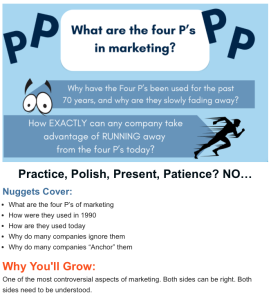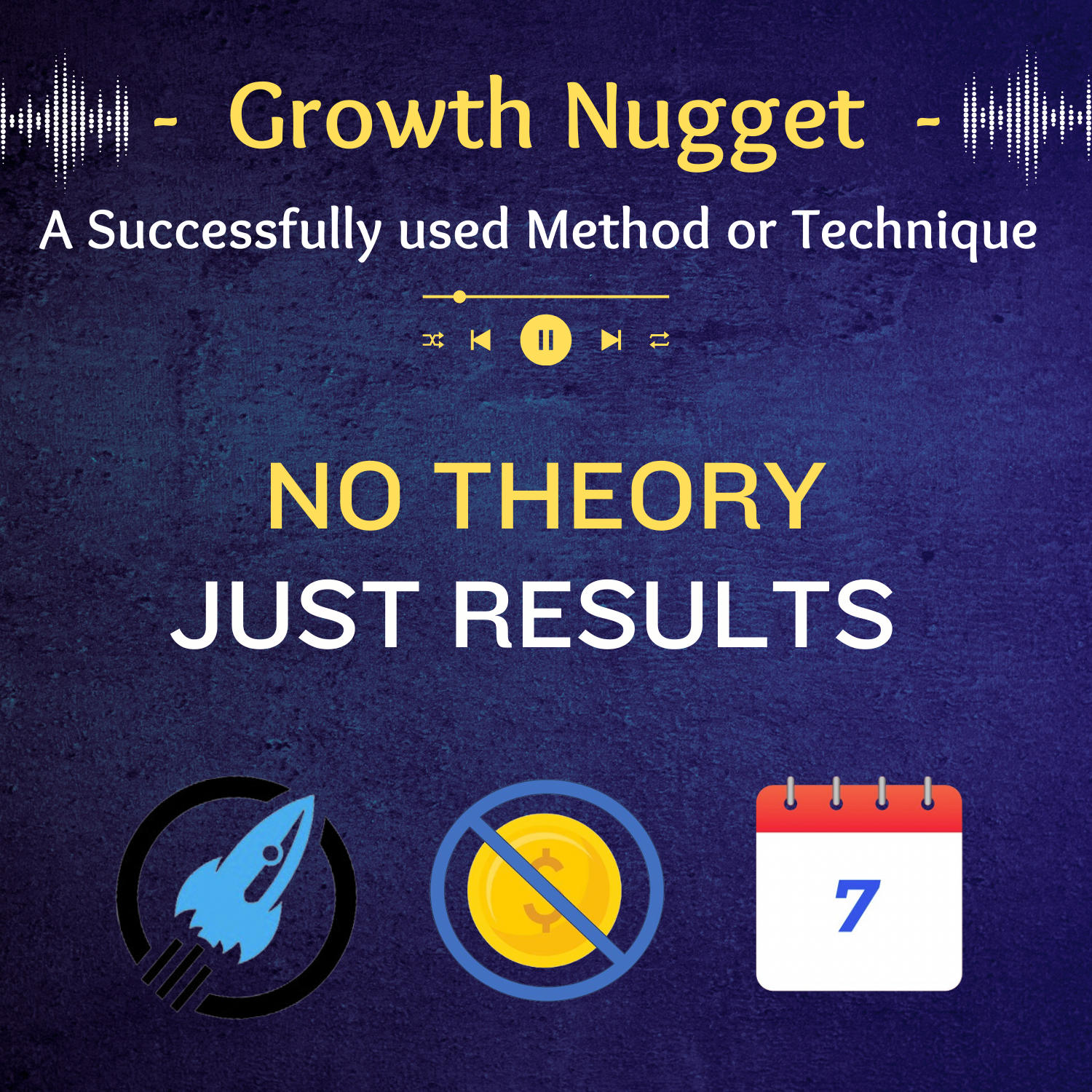Stop Selling The 4 P’s
$23.00
A Core Anchor of Many Great Marketing Strategy Plans
For close to 100 years marketing experts taught business owners that they needed to focus on the four P’s. Product, Price, Placement (think “shelf space”), and positioning. The internet has forced every marketer and business owner to look at their product or service from a completely different angle.
This growth nugget shows the exact method by which a product or service can be shown to the world in a way that separates itself from any competition. Ironically, the last 20 years of data have shown that the traditional markers of “price and positioning” are now VERY low on a marketer’s “concern” list.
This nugget is very enlightening to anyone concerned with growing a product or service. A true “must learn”.

A Core Anchor of Many Great Marketing Strategy Plans
For close to 100 years marketing experts taught business owners that they needed to focus on the four P’s. Product, Price, Placement (think “shelf space”), and positioning. The internet has forced every marketer and business owner to look at their product or service from a completely different angle.
This growth nugget shows the exact method by which a product or service can be shown to the world in a way that separates itself from any competition. Ironically, the last 20 years of data have shown that the traditional markers of “price and positioning” are now VERY low on a marketer’s “concern” list.
This nugget is very enlightening to anyone concerned with growing a product or service. A true “must learn”.
(0:00 – 1:04)
I would, well, I did for years do a stump speech that business centers on the four M’s. You need a nice market, you need to prove that people are willing to buy something, you need a good working model, the letter M for model, you have to have solid management, people that have been there done that, and then you’ve got to have some money. You don’t need money to start with because good ideas are magnets to money, but the four M’s, you could make a case, are the centerpiece of business.
I would not answer that that way today. I would say that the four M’s, you know, still play a part, they’re still deep anchors, but I think the more I dig into what grows businesses today, I’m gonna switch my vernacular and my stump speech to content and relationships. Spent a lot of time watching the Super Bowl commercials this past Sunday, and every commercial was content.
(1:05 – 2:05)
Every single commercial was telling a story or taking someone deeply into something through content, and then business transactions that involve a dollar sign, most of them, and especially the significant ones that are over a hundred dollar transaction, which is 95% of all revenue transactions, they involve relationships. You got to know you, they got to like you, they got to trust you, and we live in a scared society. The internet allows a lot of pervasive thought, and people are running scared today.
18 months ago is like eternity when it comes to the internet. We’re living in dog years, that’s like ten years ago. So one of the things that we are caught doing a lot, not just myself, but our whole management team, we hold a couple conferences a year, and anything that comes off of our stage must be a case study.
(2:06 – 3:57)
We never teach theory, we don’t teach, you know, hyperbole, we don’t bring in subject matter experts that tell you what worked ten years ago. The only thing that comes off our stage three days in a row, twice a year, is case study, provable evidence, hey, this is what we did, things or events that came to us either at a conference or as part of a growth contract. So I get to play for you a little bit of what came to us and our recommendations.
We’re going to start off, this one is centered around, I was at a conference in Vermont and a gal asked me the following. Basically she says, ‘I’m a 55 year old jewelry designer, I’ve been designing jewelry my whole life for other companies, I made a decision, next month I start my own company, I’ve already filed the paperwork, and I got a guy to do my website, although it hasn’t been started yet. So my question to you,’ and she’s talking to me, I’m on like an expert panel, ‘is if you were me, where would you start?’ This one was set aside for me, there was other people on the panel, but this was solely mine, and I said, ‘Well, number one, you have to recognize that even though your jewelry is going to be custom designed, it’s jewelry, and jewelry is a commodity, and I think you might want to look at the case study Tom’s Shoes.’ I asked the audience, ‘Anybody ever here bought from Tom’s Shoes?’ A couple people raised their hand, and I said, ‘Why?’ They said, ‘Well, if you buy a pair of shoes from Tom’s, they will of course, you know, send you a brand new pair of shoes, but they will also send a brand new pair of shoes to a child somewhere in the world who’s never worn shoes before.’


